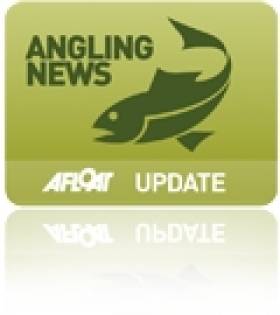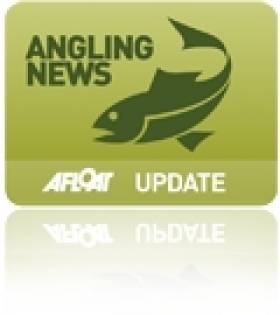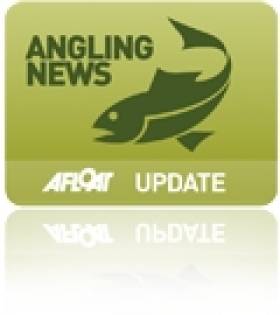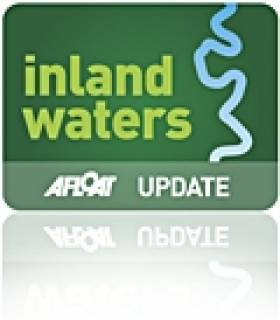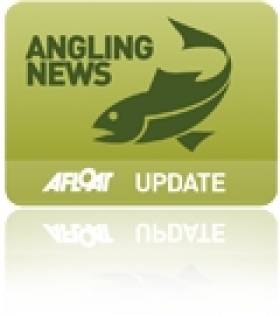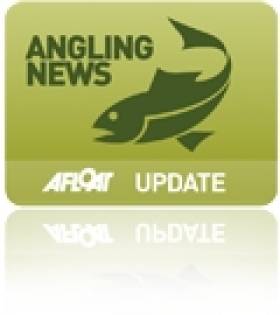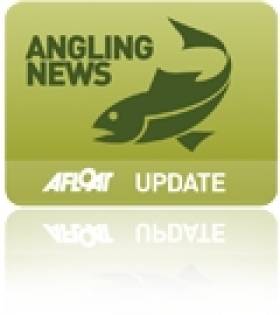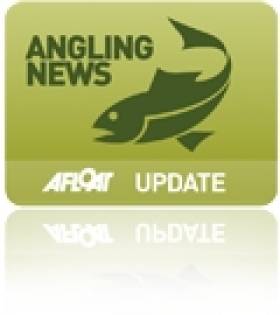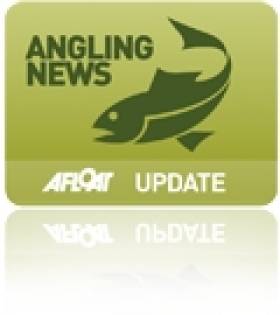Displaying items by tag: Inland Fisheries Ireland
#ANGLING - Inland Fisheries Ireland (IFI) has been successful in a circuit court case against a Louth man who appealed a district court decision over illegal salmon fishing.
Pat Smith of Annagassan, who was appealing the severity of the sentence handed down by the District Court in April last year, was ordered to pay two fines totalling €600 and costs of €2,369 to IFI in a hearing at Dundalk Circuit Court on Friday 11 May.
Smith was found to be illegally fishing in September 2010 after fisheries officers from the Dundalk district apprehended him with a fixed net at the shores of Annagassan, the tidal section of the Dee and Glyde rivers.
Court proceedings were initiated and on 14 April 2011 Smith was convicted and fined €600 and ordered to pay total costs of €880 to Inland Fisheries Ireland.
Smith appealed this case on two counts: first on the townland where the incident took place, and secondly on the severity of the sentence. The first count was dropped by the defendant just before proceedings began in the circuit court.
On the second count witness Assistant Inspector Ronan O’Brien gave evidence of events of the day in question and outlined that all rivers on the East Coast, with the exception of the River Fane, were closed for salmon fishing due to declining salmon stocks.
Judge Terry O’Sullivan stated that the offence committed was serious and had to be treated as such because salmon stocks were in decline around the country and were an important part of our heritage. He ordered Smith to pay both fines totalling €600 within six months by default or face six months imprisonment. The judge also ordered him to pay total costs of €2,369 to IFI with six months to pay.
Since 2006 IFI has engaged in conservation measures to combat the decline in salmon numbers. This resulted in an end to the interceptory mixed stock fishery for salmon throughout Ireland, and affected newsmen who availed of the Hardship Scheme were compensated for their loss.
As previously reported on Afloat.ie, the IFI Salmon Conservation Scheme has been extended through this year, with funding increased to a total of €200,000.
The pilot scheme will facilitate the rehabilitation of salmon stocks, giving priority to rivers below their conservation limit which have the greatest prospect of recovery.
According to IFI: "At the peak of salmon production in the 1970s, approximately 3,000 salmon were caught commercially in Dundalk waters. This declined to an all time low in 2006 when only 225 were caught in the entire Dundalk bay area. Annagassan would have been a traditional location for poaching salmon and sea trout in the past.
"Consequently all the rivers on the East coast, with the exception of the River Fane, were closed for salmon fishing. Only this year are the Castletown, Glyde and Dee rivers open for catch-and-release only."
The fisheries body added: "It is hoped that these measures will preserve our stock of Atlantic salmon, which are not only a valuable resource for our economy, but also an important part of our natural heritage as salmon and trout have been running our rivers since the last ice age."
Members of the public can report incidents of poaching and pollution to the IFI at freephone 1890 34 74 24 or for easier recall 1890 FISH 24.
#ANGLING - Inland Fisheries Ireland (IFI) has successfully won a court case against a Co Louth man for illegal salmon fishing.
John Carney from Dunleer was given a four-month prison sentence, fined €400 and ordered to pay costs of over €1,400 to Inland Fisheries Ireland in Drogheda District Court on 24 April after he was found to be illegally fishing in September 2011.
Dundalk district fisheries officers apprehended Carney with fixed nets in the tidal section of the River Glyde. When questioned by officers, the defendant was found to have set five nets, was in possession of illegally caught salmon and refused to give his name and address.
Fisheries officers Thomas Duffy, Seamus Kelledy, Paul O’Reilly and Assistant Inspector Ronan O’Brien were present and court proceedings were initiated. Both sides were represented in court and Carney fought the charges being brought against him.
Judge Hamill convicted Carney under Sections 96, 182 and 301 of the 1959 Fisheries Act, for using a fixed engine which was capable of taking salmon or sea trout, being in possession of illegally caught salmon and for refusing to give his name and address when lawfully demanded.
He was given a four-month prison sentence, fined €400 and ordered to pay total costs of €1,440 to Inland Fisheries Ireland.
Carney had been fined and convicted for previous fisheries offences in the area over the last number of years, the most recent being in 2010 when he was convicted for illegal salmon fishing.
IFI says Dundalk's rivers "remain vulnerable" due to the decline of salmon stocks. In 2006 a series of conservation measures were introduced in order to combat the decline in salmon numbers.
"The interceptory mixed stock fishery for salmon ceased throughout Ireland and netsmen who availed of the Hardship Scheme were duly compensated for their loss of the salmon fishery," said IFI. "At the peak of salmon production in the 1970’s, approximately 3,000 salmon were caught commercially in Dundalk waters annually. This declined to an all time low in 2006 when only 225 were caught in the entire Dundalk bay area. Annagassan would have been a traditional location for poaching salmon and sea trout in the past.
"Consequently all the rivers on the East coast with the exception of the River Fane were closed for salmon fishing. The Dee, Glyde and Castletown rivers are open for catch and release only."
The fisheries body added: "It is hoped that these measures will preserve our stock of Atlantic salmon, which are not only a valuable resource for our economy, but also an important part of our natural heritage as salmon and trout have been running our rivers since the last ice age. Anglers also need to continue to be vigilant to report any illegal fishing incidences to the board."
IFI reiterated its call on the public to report poaching and pollution incidences on its freefone number 1890 34 74 24, or for easier recall 1890 FISH 24.
Inland Fisheries Ireland Has Success in Illegal Fishing Cases
#ANGLING - Inland Fisheries Ireland (IFI) has had success with two recent court cases in the Drogheda and Dundalk areas, resulting in fines of €1,550 issued and expenses of €2,101 awarded.
In the Dundalk district, Vladimir Prokopieve was found to be using nets at Drumcar Lake in Inniskeen, Co Monaghan in September 2011 with the intention of taking coarse fish and pike illegally.
Prokopieve was apprehended by Assistant Inspector Ronan O’Brien and was found to have more than four coarse fish over 25cm in his possession, as well as pike exceeding 50cm.
Following a number of summons issued to the defendant, the case was heard at Dundalk District Court on 22 March. Prokopiev appeared in court and entered a guilty plea.
Judge Sean McBride convicted him under Section 95 of the 1959 Fisheries Act in relation to fishing in fresh water for coarse fish by means other than rod and line. He also convicted him for breaches of the coarse fish Byelaw 806 of 2006 and the conservation of pike Byelaw 809 of 2006.
The defendant was fined a total of €1,400 with one month to pay, while Inland Fisheries Ireland was awarded €927 expenses for bringing this case.
In the Drogheda district, Derek Nugent was found to be fishing out of season on the River Kells Blackwater, a tributary of the River Boyne, on 8 October 2011.
Under the salmon conservation laws, the River Boyne has been catch and release for salmon since 2006 in an effort to preserve the valuable salmon stocks.
Nugent was apprehended by Assistant Inspector Gerry Conaty and an on-the-spot fine of €150 was issued with 21 days to pay. The fine was not paid and a summons was issued to Nugent.
This case was heard on 14 March at Navan District Court, and Nugent pleaded guilty. Judge McMahon made it clear that the defendant had brought the prosecution on himself by his failure to pay the fine and ultimately by giving a false name and address.
Judge McMahon convicted him under section 301 of the 1959 Fisheries Act and fined him €150 with €1,174 expenses awarded to Inland Fisheries Ireland with six months to pay.
Inland Fisheries Ireland encourages members of the general public to report incidences of report poaching and pollution by calling 1890 347 424 or easier recall 1890 FISH 24.
Inland Fisheries Ireland Looking For Seasonal Fishery Officers
#JOBS AND CAREERS - Inland Fisheries Ireland (IFI) is seeking to recruit a number of staff as Fishery Officers nationwide for a maximum period of four months during 2012 and will shortly commence a process to fill these positions.
The Fishery Officer will be primarily concerned with the implementation and enforcement of the provision of the Fisheries Acts, Water Pollution Acts and other relevant statutory provisions.
He or she is required to provide, in co-operation with other fisheries staff, comprehensive conservation and protection services, as well as improvement, development and fisheries management support services, both inland and at sea, within any part of a fisheries district and/or any other area assigned within one or more fisheries districts.
The Fishery Officer is also expected to assist either directly or indirectly in fisheries-related research projects.
Salary at the first point of the Fishery Officer Scale is €22,349 plus an Unsocial Hours allowance, which will be paid at either 50% or 100% relative to the number of unsocial hours worked.
Applications should be mailed for the attention of Ms Sandra Doyle, REF: HR/FO/2012, Inland Fisheries Ireland, Swords Business Campus, Swords, Co. Dublin or by e-mail to [email protected] by the close of business on Tuesday 24 April 2012.
For further job details contact Sandra Doyle at 01 8842 612. Please note that late applications will not be processed.
Trial Dredging to Help Rid Barrow of Invasive Asian Clam
#INLAND WATERWAYS - Trial dredging operations to curtail the spread of Asian clams at designated sites in the lower River Barrow are set to conclude today.
Inland Fisheries Ireland (IFI) employed the use of a a traditional cockle harvesting boat to physically remove the clams from the river bed, in an effort to explore methods of controlling or eradicating what it describes as an "ecosystem-changing invader" in other infested waters.
IFI scientists supervised the trials, using teams of divers to quantify the result of the dredging efforts.
The Asian clam (Corbicula fluminea) is "a most unwelcome addition to the fauna of the lower River Barrow". The bivalve mollusc is regarded as "one of the most notorious aquatic invasive species in the world".
First recorded in the river downstream of St Mullin’s in April 2010, subsequent IFI studies have revealed that the Asian clam is firmly established in the lower Barrow and in the River Nore downstream of Inistioge. Populations have also been recorded in the River Shannon and in Lough Derg.
In one section of the River Barrow the clam has achieved a "staggering" density of almost 10,000 per square metre.
Dr Joe Caffrey, senior scientist with IFI, said of the trial dregding: “It is imperative that every effort is made to control the expansion and spread of this highly adept invasive species.
"The results from these trials will inform future national management plans for this most unwelcome non-native species and will, at the very least, dramatically reduce the numbers of individuals in the test sites.
He added: "In tandem with these trials, research effort is being focused at producing other control methods that can be targeted as this species.”
Enniscorthy Anglers Reach Agreement Over Slaney Salmon
#ANGLING - Enniscorthy anglers have reached an agreement with Inland Fisheries Ireland (IFI) over the use of shrimp as bait to catch the Slaney's prized salmon, according to the Enniscorthy Guardian.
The Enniscorthy Local Anglers Association has also agreed with IFI officials not to overfish the river when levels are low.
New signage has now been installed along the river through the town reminding salmon anglers that no more than 15 rods will be allowed at any one time when the water is running low.
All fish must also be returned to the Slaney as per the agreement.
As previously reported on Afloat.ie, the Wexford town's anglers had secured the support of the IFI board in their call to prevent the threatened ban on using shrimp as bait.
Members of the Enniscorthy Local Anglers group argued that shrimp is ideal bait for catching salmon downstream, and said they were "baffled" by the ban on its use by IFI officials.
Pickings have been slim so far this season, with only one fish caught since it began a month ago. But local angler Kris Murphy is "generally optimistic" about the river's salmon stocks.
The Enniscorthy Guardian has more on the story HERE.
Draft Net Season Won't Be Brought Forward Says Minister
#ANGLING - Minister for Natural Resources Fergus O’Dowd has confirmed that there is no proposal for the extension of the salmon draft netting season.
In response to concerns expressed by the angling community and highlighted by Derek Evans in The Irish Times last week, Minister O’Dowd emphasised that conservation and management of salmon and sea trout is key to protecting our valuable natural resources.
“Recent reports that the commercial season will be extended in certain rivers are untrue and I can confirm that for the 2012 season, the commercial fishing season remains as it was in all areas, with the River Suir still on a reduced season for snap fishing," said the minister.
"I am aware that confusion can arise due to the necessary extent of regulations in place. However, I am not considering any proposal for the extension of the commercial season."
The minister reminded that Inland Fisheries Ireland is the body that enforces Ireland's "extensive" fisheries legislation.
"IFI has offices throughout the country where advice can be sought. There is also a comprehensive and regularly updated website and information is also disseminated on Facebook and Twitter," he said.
Meanwhile, IFI chief executive Dr Ciaran Byrne said that the legislative code is regularly updated to ensure that Ireland's fisheries continue to be protected on the basis of information from IFI’s Standing Scientific Committee and IFI management advice.
“Only rivers with exploitable surpluses are open during the spring season and no fishery is open for commercial exploitation during this time," said Dr Byrne. "Fisheries that are classified catch-and-release or closed for salmon are now protected under bye-law 897 which prohibits the use of worms and the use of any fish hooks other than single barbless hooks.
"IFI’s priorities are maximising the return to Ireland, protecting sustainable jobs in isolated rural communities and promoting our wonderful angling resources," he added.
Survey to Assess Value of Irish Angling
#ANGLING - Inland Fisheries Ireland (IFI) has appointed Tourism Development International (TDI) to undertake a Socio-Economic Survey of Recreational Angling in Ireland.
The overall objective of the survey, which will run over the course of 2012, is to establish the current volume and value of domestic and overseas recreational angling in the country.
Pike, coarse fish, bass, salmon, sea trout, brown trout and sea anglers will all be invited to participate in what is described as Ireland's most comprehensive angling survey undertaken in decades.
The survey will inform IFI and its tourism partners in relation to the business of angling in Ireland and also enable improved strategic planning and decision-making in terms of product development and marketing.
"Anglers are the key to this survey," commented Minister of State for Natural Resources Fergus O'Dowd. "They know the resource and they understand the importance of sustainability. What anglers contribute to Ireland’s economy is unknown but I am certain that it is significant.
"Angling takes place in every river and lake in Ireland and all around our coastline. There is no town or village in Ireland that doesn’t have anglers."
He added: "It is imperative that the inland fisheries and sea angling resources are managed in the best way possible to ensure enjoyment for our local and visiting anglers, sustainable jobs in rural communities and maximising its potential to add to Ireland’s economy.
"Getting the right information from those most involved will greatly assist in improving the angling product."
The survey comprises two parts: a household survey and a survey of recreational anglers which will commence in April. Anglers will be met at fishing locations throughout Ireland and invited to participate there and then, or later by phone or online. IFI says that every effort will be made to accommodate participation.
- angling
- Inland Fisheries Ireland
- IFI
- Tourism Development International
- TDI
- survey
- SocioEconomic Survey of Recreational Angling in Ireland
- Pike
- Salmon
- Sea Trout
- brown trout
- coarse angling
- sea angling
- tourism
- business
- marketing
- development
- Minister of State for Natural Resources
- Fergus O'Dowd
- sustainability
- inland waterways
- jobs
IADA Hosts 'Biosecurity Awareness' Evenings for Anglers
#ANGLING - The Irish Angling Development Alliance (IADA) is running a series of biosecurity awareness evenings at venues across Ireland over the next two months.
The evenings follow from the "success" of the IADA's awareness section at the recent Ireland Angling Show, and will provide an opportunity for more people to "meet with experts in the field and see what invasive species are first-hand".
Three events, in association with Inland Fisheries Ireland, are scheduled:
- 27 March at the Wetlands Centre, Ballybay, Co Monagahan (hosted by the Ballybay Angling Association)
- 18 April at the Cavan Crystal Hotel, Cavan (hosted by the Cavan Anglers Club)
- 23 May at the Salthill Hotel in Salthill, Galway (hosted by the Galway CAC)
All events run from 7:30pm till 9pm. Admission is free and all are welcome.
For more information contact Peter Walsh at [email protected]
New Angling Guide for Lough O'Flynn and Upper Suck
#INLAND WATERWAYS - Inland Fisheries Ireland (IFI) officially launched the Lough O’Flynn and Upper Suck Angling Guide at the Old Stonehouse Restaurant in Ballinlough recently.
The guide opens to Lough O'Flynn, a 300-acre limestone lake situated 2km from Ballinlough and one of IFI’s many managed lakes requiring a permit.
This lake holds a stock of wild brown trout and is also stocked with brown trout each year which provides an excellent opportunity for all kinds of anglers and those wishing to take up the sport to learn how to fish for trout.
Meanwhile, the centrefold of the guide showcases the Upper Suck catchment from Lough O’Flynn through Co Roscommon and Galway until the Shiven tributary joins, along which good quality coarse, pike and trout angling can be expected.
With breathtaking scenery, this is the perfect place for anglers who can fish almost undisturbed from dawn till dusk.
There are also a considerable number of sections dedicated to anglers with disabilities, such as the Donamon angling stretch which has 30 fishing stands available with individual car parking bays and toilet facilities. This section has proven extremely popular, and IFI says it is committed to ensuring that sections like Donamon continue to open fishing up for everyone.
Amanda Mooney, director at IFI, said: “The guide offers a great source of information on angling hotspots for various types of species, access points and facilities, legislation and safety.
"All in all everything you need for planning a fishing trip. The guide and angling promotion in general supports local businesses and communities in sustaining jobs.”
The Lough O’Flynn and Upper Suck Angling Guide is available from IFI outlets and local permit agents in Ballinlough, Co Roscommon.
Inland Fisheries Ireland also marked the retirement of John Ryan, assistant inspector for Lough O’Flynn and the Suck catchment, after 41 years of service.
Ryan was involved in many areas and aspects of fisheries throughout his career, and was particularly noted for his positive engagement with various groups from angling clubs and development associations to local authorities, businesses and communities.


























